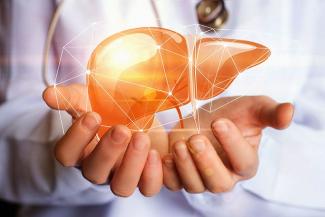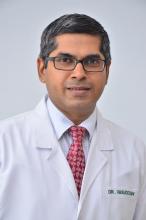
Dr. KR Vasudevan, Director Liver Transplantation, PSRI Hospital talks about the major risks for a liver disease and how to keep our liver healthy. Also, are herbs and supplements safe for the liver? #WorldLiverDay
NonAlcoholic Liver disease or NAFLD is the most common cause of Hepatic disease around the world. Why is that?
Increasing opulence has brought about changes in life style. Availability of processed food and decreasing physical activity has resulted in accumulation of body fat. The deposition of fat in the liver is termed as NAFLD. The incidence of obesity and NAFLD is increasing at an alarming rate. Between a third and half of the population is showing signs of NAFLD in some areas, including parts of India. Obesity and development of NAFLD in children is also increasing at a rapid rate and this is very concerning. These children have the highest risk of developing complications directly related to liver disease in the long life ahead of them.
Can you please explain the difference between NAFLD and NASH?
NAFL(Non-alcoholic Fatty Liver) is the accumulation of fat inside the liver cells, seen as fat droplets. NASH (Non-alcoholic steatohepatitis) is when there is damage to the liver cells resulting from the deposition of fat in them. NAFL does not increase the risk of harm to the patient from the liver aspect. NAFL can progress to NASH in a subset of patients and this increases risk of harm directly attributable to liver disease.
What is decompensated cirrhosis? What causes it and what is the prognosis like?
Decompensated cirrhosis is when the liver is not able to provide for the functions the body requires, and this results in signs and symptoms that is seen or experienced by the patient. Symptoms first appear with major stressors: mental, physical or illness. As the disease progresses even minor stress like not having passed stools brings forth symptoms. Symptoms seen are: jaundice, water in the belly (ascites), edema in legs, vomiting of blood or encephalapathy (disorientation, confusion and coma) Person with decompensated liver disease has increased risk of admission to hospital or ICU and often is at risk of death in the near term.
Does Diabetes increase risk of NAFLD or does NAFLD increase risk of Diabetes?
Chicken and egg story.
Most commonly NAFLD is related to excessive weight gain, resistance to insulin and development of diabetes. Similarly long standing diabetes results in NAFLD in a high proportion of patients. Better control of diabetes results in regression of damage to the liver resulting from fat deposition
Related article: What does NAFLD mean for people with diabetes
What are the most effective ways to reverse NAFLD?
Correction of the underlying cause of the fatty liver disease is the most effective to reverse NAFLD. The steps include - life style modification with a target to achieve optimal body weight by a combination of dietary restriction and increased physical activity. Medication is useful only to control the associated diseases like diabetes and hyper cholesterolemia.
Is Vitamin E a promising supplement for patients with NAFLD? Is it commonly prescribed?
Vitamin E was one of the first medications to be investigated in the management of NAFLD. It works as an antioxidant, by blocking effects of damaging ‘toxins’ (free radicles) that cause liver damage. In doses of 800mg a day, it has shown to be of marginal benefit. However, it has side effects when taken in this dose which potentially cancel out the beneficial effects. I rarely recommend Vit E to patients with NAFLD, and do so only after other treatments like life style modifications have been attempted for 6-12 months and did not work.
Are there any medications a patient should avoid if they have a fatty liver?
Many herbal preparations, medicines of alternative systems are taken for treatment of fatty liver disease. Often these are taken without informing the doctor, many a time together with medicines of the allopathic system. These are also taken as an attempt to an ‘easy’ cure of fatty liver without attempting life style modification - which includes dietary restrictions and increase in physical activity. These have not shown to be of benefit consistently. Moreover, they often result in liver damage. Some medicines of allopathic system causing liver toxicity are to be avoided, most of these are to be taken in consultation with the doctor who would adjust the doses or change to alternative liver safe medicines.
What is the association between PCOS and fatty liver?
PCOS is a common endocrine problem seen in premenopausal women. Resistance to insulin is one of the mechanisms involved in the disease process, this is also involved in the process of NAFLD. Because the mechanism of disease is the same in both groups, patients with PCOS often have NAFLD.
What is the best way to keep your liver healthy?
- There is nothing tricky about taking care of your liver: follow a healthy lifestyle and keep a close eye on medicines and supplements.
- Don’t drink too much alcohol, this can cause swelling or scarring of the liver, which could prove fatal.
How much of alcohol is too much?
Studies show more than two drinks for males and one in lady for a day is harmful. Once a fatty liver is developed, it is not clear if even these ‘safe’ amounts are really safe for the liver and I would recommend discontinuation of alcohol consumption. - Eat a healthy diet and get regular exercise, keep your weight under control.
- Get tested for hepatitis C and B, high cholesterol and diabetes, and treat if any are positive
- Drinking two cups of coffee a day lowers risk of liver disease
- Be careful with herbs and supplements - many can harm your liver
The liver is a very forgiving organ, but has its limits!
If a person has fatty liver, how often should he get his liver checked?
Because fatty liver does not progress and cause long term problems, the follow up of fatty liver is not beneficial. However, we need to look into the cause for fatty liver and for presence of associated inflammation (NASH), and make the necessary adjustments - with changes in life style or addition of medication. The follow up protocol therefore differs with the cause e.g.. 3 monthly for diabetes.
Who is most benefitted by the Hepatitis A vaccine prescribed?
The vaccine is meant to prevent a person from getting hepatitis A. Studies in India have shown that majority of Indian children gets hepatitis A in childhood and develop immunity (resistance) that lasts life long. A similar reaction (immunity) develops in almost every person who has been given the vaccine within a month.
As most adults would have suffered the disease and have developed protective antibodies, the vaccine is not required. It could be considered in adults at high risk of the disease-
- user of recreational drugs
- travellers to places where the virus is endemic
- men who have sex with men
- people with chronic liver disease (because of their increased risk of serious complications if they acquire hepatitis A)
In children - the World Health Organisation and the Government of India do not include the vaccine in the list of vaccines given to all the children because most children who acquire hepatitis A recover fully from the disease. However, the vaccine is very effective and has very few side effects. Hence many parents choose to vaccinate their children when given the choice to do so.

Dr. KR Vasudevan is a pioneer in the field of Liver Transplant in India. He was part of team of eminent surgeons who were responsible for starting liver transplants in India back in 2004-2007






